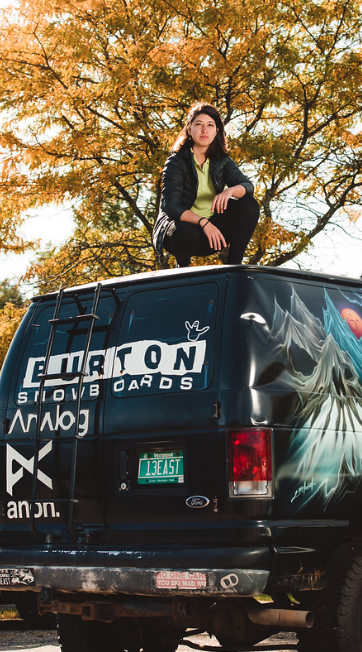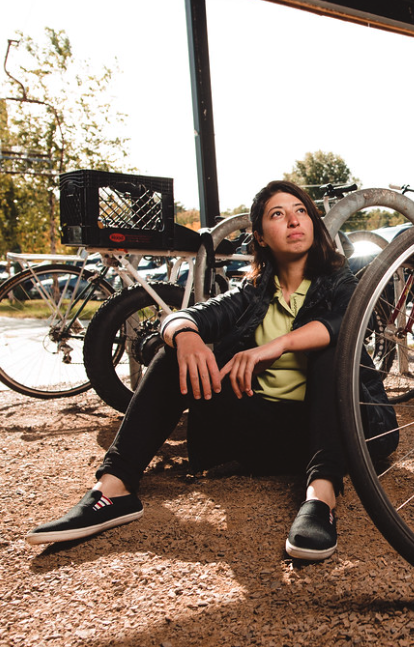
Samar Khan was born and raised in a modest, conservative family in a small village in Dir, Khyber Pakhtunkhwa, Pakistan. Life for women from her region usually consisted of getting married to a man of their parents’ choosing while in high school or shortly after graduating. As a child she longed to pursue martial arts, but it was hard to gain the support of her family, who leaned towards her pursuing an education and focusing on a career in academics.
While earning a degree in physics at Federal Urdu University, Samar noticed a flyer on campus for a paragliding course from The Army School of Physical Training. Samar was drawn to this opportunity and eventually convinced her family to allow her to take the course. It was life-changing for Samar to finally be allowed to pursue physical activity. During her training, she realized the impact that an active lifestyle had on her emotional and physical wellbeing.
When she returned home, she started making sporting expeditions by herself in secret. She took up mini treks, hikes, and cycling. Samar’s adventurous spirit soon could not be kept a secret, and she announced that she wanted to take a ten-day expedition with a friend to the Pakistan and China border. She fell in love with the freedom and joy that comes with adding sports to her life. “It took me three or four months to get the green signal from my family so that I could travel. I promised to keep them updated and share everything with them.”

Samar and her friend stayed in remote villages of Upper Khyber, exploring the mountains on their journey towards the border. The trip went viral on social media, and, as they made their way back home through the capital city of Islamabad, the entire Pakistani media gave them a welcoming reception. It was a historic achievement by a Pakistani woman. Samar says the publicity and exposure brought her a lot of appreciation, but not everyone approved.
“I faced threats and harassment all along my sports journey,” Samar says. Since women and girls from Khyber Pakhtunkhwa were never allowed to travel alone, wear sports clothes, or work with men, Samar’s interest as an adventure athlete was not always socially acceptable.
Combining her love of the outdoors and cycling, Samar developed a passion for mountain biking. “It is something that sets me free from all the needs, you do not need money for fuel. You just eat, sleep, and keep on pedaling,” she says. “Mountain biking makes it very convenient and easy to explore mountains more intimately.” It has helped Samar unleash her true personality, while improving her physical and mental stamina.

In her mid-twenties, Samar realized she wanted a career in adventure sport and began planning additional expeditions. Samar recognized that she could use her platform to be an advocate. “I talk to people about where I am from and what I’ve done,” she says, “in hopes of changing their perception towards gender and sport in my country. It becomes something their daughters can do and dream about.” Samar steadily received more support from her country and the media with each expedition she undertook. She eventually became a role model for young Pakistani women.
The next big challenge was to provide for herself financially, this sometimes led to strains in the family, as they didn’t see sport as sustainable. “I was doing side jobs, sponsorship hunts, and running after paid projects,” Samar recalls. “The initial couple of years were very tough, and at times I had to travel with empty pockets or take loans from my friends.” Samar took every challenge hurled her way and used it as motivation to push further. She started saving money for her next expedition, where she would cycle the glaciers of Pakistan, the third largest non-polar glacier, Biafo (4500m).
Many people warned Samar against cycling Biafo, as it’s an untamed mountain with extreme conditions lacking paths and roads. At certain points during the climb, she was forced to dismantle her bike, and trek to find the most cycle friendly parts of the glacier. Samar spent two weeks in treacherous conditions before she successfully finished her expedition. Once again, her feat received viral publicity and gave her more acceptance in society as an adventure athlete—another first triumph for a Pakistani athlete and another stereotype broken by Samar. After Biafo, Samar cycled the highest peak in Africa becoming the first person from Pakistan to complete the 5,895m climb up Mt. Kilimanjaro.
With her growing exposure, Samar was selected to be part of the 2018 Global Sports Mentoring Program (GSMP), which helped her realign her goals and provided her with the tools for personal and professional growth in order to empower women in Pakistan. “I still remember, when I was going to the U.S., I sold my mountain bike and bought myself a traveling bag and a few shirts,” she says. “I had five dollars in my wallet when I landed in Washington D.C.” Her mentorship at Burton Snowboards with Donna Carpenter, as well as her time with the network and support of the GSMP, helped her reflect internally and evolve into a more self-assured person.
During her time at the GSMP, Samar designed her own snowboard and included the phrase —“Reborn in the Mountains”—because the mountains were always the place where she felt the most alive. What started as a journey of personal empowerment led her to the path of social empowerment. “I felt alive after so many years because of sports so that was the reason for me choosing it as a career,” she says.
Samar dreams of growing mountain and adventure sports on the slopes of the Hindu Kush range, and producing more professional athletes by mobilizing children in the community. She is an example of courage and determination. “For a country like Pakistan, it’s very important for women to know of their rights,” she says. “I didn’t know about mine until I reached college.” Samar hopes to continually challenge traditional gender norms, while providing opportunities for women to gain financial, physical, and mental independence.